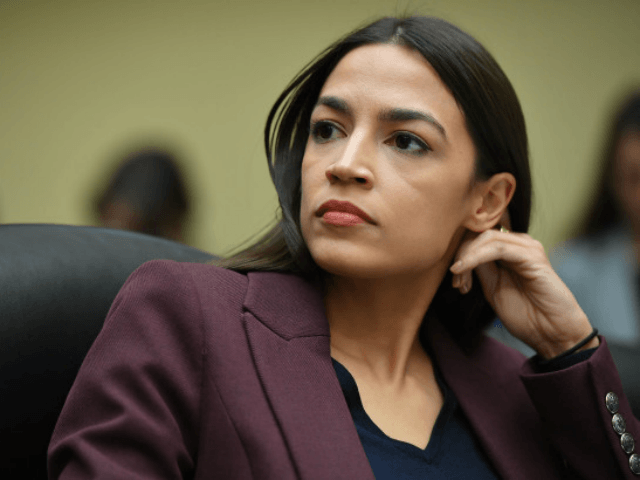Rep. Alexandria Ocasio-Cortez (D-NY), a self-declared proponent of “democratic socialism,” took pride Tuesday in questioning Wells Fargo CEO Timothy Sloan about the bank’s role in financing private projects that she considers objectionable, such as oil pipelines and prisons.
She also demanded to know why the bank should not be held financially liable for the impacts of oil spills — and even the effects of climate change.
.@RepAOC: “Mr. Sloan, why was the bank involved in the caging of children?” @AOC to #WellsFargo CEO pic.twitter.com/Pvfuv2wfXe
— Alexis Goldstein (@alexisgoldstein) March 12, 2019
The CEO of Wells Fargo said they chose to finance the unstable Dakota Access Pipeline over Standing Rock Sioux objections, because the bank determined it was “worth the risk.”
To whom?#DAPL has leaked at least 5x. And we, the public, are left to pay for cleanup+destroyed land. https://t.co/ugGY1BeBdO
— Alexandria Ocasio-Cortez (@AOC) March 12, 2019
This, right here, is a problem.
Institutions can engage in unlimited financing of fossil fuels, building unstable pipelines + reaping profits, but when the bill comes to clean up oil spills & fix damages – they can conveniently kick the can.
So, who will pay for climate change? https://t.co/TlfmJKVwjb
— Alexandria Ocasio-Cortez (@AOC) March 12, 2019
One way to interpret these exchanges is to understand them as “red meat” for the “Resistance.” The far-left relishes confrontations with bank executives.
For example, a hard-core group stalks JPMorgan Chase CEO Jamie Dimon everywhere he goes, “scaling Park Avenue flagpoles, blocking Seattle traffic with tepees, bursting into conferences, and blasting audio of crying children outside his apartment,” Bloomberg notes.
Another way to look at Ocasio-Cortez’s line of questioning is to conclude she knows absolutely nothing about economics, despite boasting a degree in it.
It makes as much sense to punish Wells Fargo for a pipeline leak as it does to punish the Security Service Federal Credit Union, the country’s biggest automotive lender, for fender-benders. If we treated banks that way, all lending would stop, and Americans would be instantly poor.
She also knows nothing about climate change — a fact that was made clear last month when she released the “Green New Deal,” amidst predictions that the world would end within twelve years.
Even assuming, for argument’s sake, that climate change is happening and humans are causing it, it is impossible to quantify the costs (or benefits!) with any certainty, much less assign those costs to the banks that lend to energy projects.
Ocasio-Cortez believes Wells Fargo can be held responsible for all of society’s ills because she believes that capitalism itself is inherently destructive. In her telling, those who provide the capital — the banks — are to blame. Never mind that banks exist because ordinary people, and institutions — including unions, non-profits, and pension funds — invest in them. In her view, profit is evil, even — or especially — in the public interest.
As a remedy, Ocasio-Cortez wants to “bring democracy” into the economy. What that means, in practice, is mob rule: occupying private land to stop the Dakota Access pipeline (a protest in which Ocasio-Cortez was an enthusiastic participant); hounding bank executives at their homes; and taking over state capitol buildings. It is the opposite of democracy, in that protesters reject decisions made by democratically-elected governments.
Wells Fargo is no paragon of virtue: the bank recently paid over half a billion dollars to settle complaints that it had created fake accounts and signed up customers for services without their consent. But Ocasio-Cortez is not interested in regulating the bank. She hoped to use the hearing at the House Financial Services Committee to humiliate Tim Sloan personally so that he would drop clients that she and her party see as political targets.
One can imagine the outcry if conservatives insisted banks deny services to Planned Parenthood, or to the Service Employees International Union (SEIU). Conservatives do not believe in that kind of bullying, but socialists revel in it. New York State is already trying to make the National Rifle Association un-bankable. Conservative media outlets are next on the list.
This is what socialism looks like: the tyranny of the mob.
Joel B. Pollak is Senior Editor-at-Large at Breitbart News. He is a winner of the 2018 Robert Novak Journalism Alumni Fellowship. He is also the co-author of How Trump Won: The Inside Story of a Revolution, which is available from Regnery. Follow him on Twitter at @joelpollak.
Photo: file

COMMENTS
Please let us know if you're having issues with commenting.